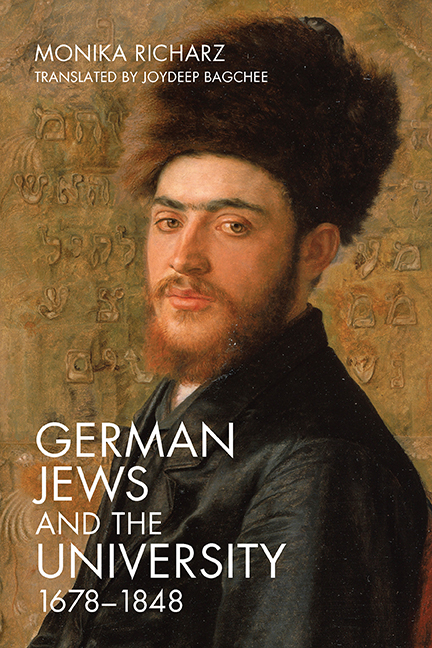Book contents
- Frontmatter
- Dedication
- Contents
- Foreword to the English Edition
- Foreword to the German Edition
- Preface to the German Edition
- Translator’s Note
- List of Abbreviations
- 1 Jewish Education in the Enlightenment Era
- 2 Jewish Encounters with the University before Emancipation
- 3 Jewish Students in the First Half of the Nineteenth Century
- 4 The Social Situation of Jewish Students in the pre-1848 Era
- 5 The Professional Experience of Jewish University Graduates
- Conclusion
- Documents
- Bibliography
- Index
1 - Jewish Education in the Enlightenment Era
Published online by Cambridge University Press: 15 September 2022
- Frontmatter
- Dedication
- Contents
- Foreword to the English Edition
- Foreword to the German Edition
- Preface to the German Edition
- Translator’s Note
- List of Abbreviations
- 1 Jewish Education in the Enlightenment Era
- 2 Jewish Encounters with the University before Emancipation
- 3 Jewish Students in the First Half of the Nineteenth Century
- 4 The Social Situation of Jewish Students in the pre-1848 Era
- 5 The Professional Experience of Jewish University Graduates
- Conclusion
- Documents
- Bibliography
- Index
Summary
Traditional Education and Upbringing
UNTIL THE EIGHTEENTH CENTURY, the traditional form of life of Jewish communities in Germany was characterized by the unity of the Jewish people, religion, and culture. The Jews of Germany lived in selfcontained corporations in precincts that the local territorial sovereign had ceded to them. These precincts were enclosed by ghetto walls only in a few cases and enjoyed extensive religious and social autonomy. In terms of professional activity, Jews were almost exclusively restricted to trading. From an economic perspective, they had the function in the individual territories of bolstering the growing power of the absolute princes. These princes possessed direct legal authority over the Jews. In particular, they collected the Judenregal, the protection money that Jews were required to pay, and thus had a financial interest in the Jews.
As a distinct “nation,” the Jews were subject to the Jewish religious law, which preserved the solidarity of the community and governed their social and intellectual life. Since the beginning of modernity, the arts and sciences had progressively emancipated themselves from the influence of the church in the larger Christian world. By contrast, intellectual life in Jewish communities in Germany was restricted almost entirely to study of the Torah and the Talmud. All scholarship and knowledge aimed at the Law. Jews were permitted to study non-Jewish subjects, collectively referred to as “external knowledge” (chochmot chizonijot), only insofar as this served an understanding of the Torah or, as was the case with medicine, in fulfilling its commandments. Compared with the Middle Ages, by the sixteenth and seventeenth centuries the cultural isolation of the Jews in Germany had increased to such an extent that they risked stasis. Even the centers of Talmudic studies could now be found in Poland.
A determination to preserve tradition had not always meant intellectual isolation from the outside world in Jewish history. We know of Jews who knew the culture and science of their times as well as they knew the Talmud and the Torah in both the Hellenistic world and, later, in the Arabic and Spanish worlds. Not coincidentally, Moses Maimonides in particular was rediscovered in the eighteenth century as exemplifying this attitude and became a prototype for Jews who had begun to take an interest in the sciences of their time.
- Type
- Chapter
- Information
- German Jews and the University, 1678-1848 , pp. 1 - 15Publisher: Boydell & BrewerPrint publication year: 2022

